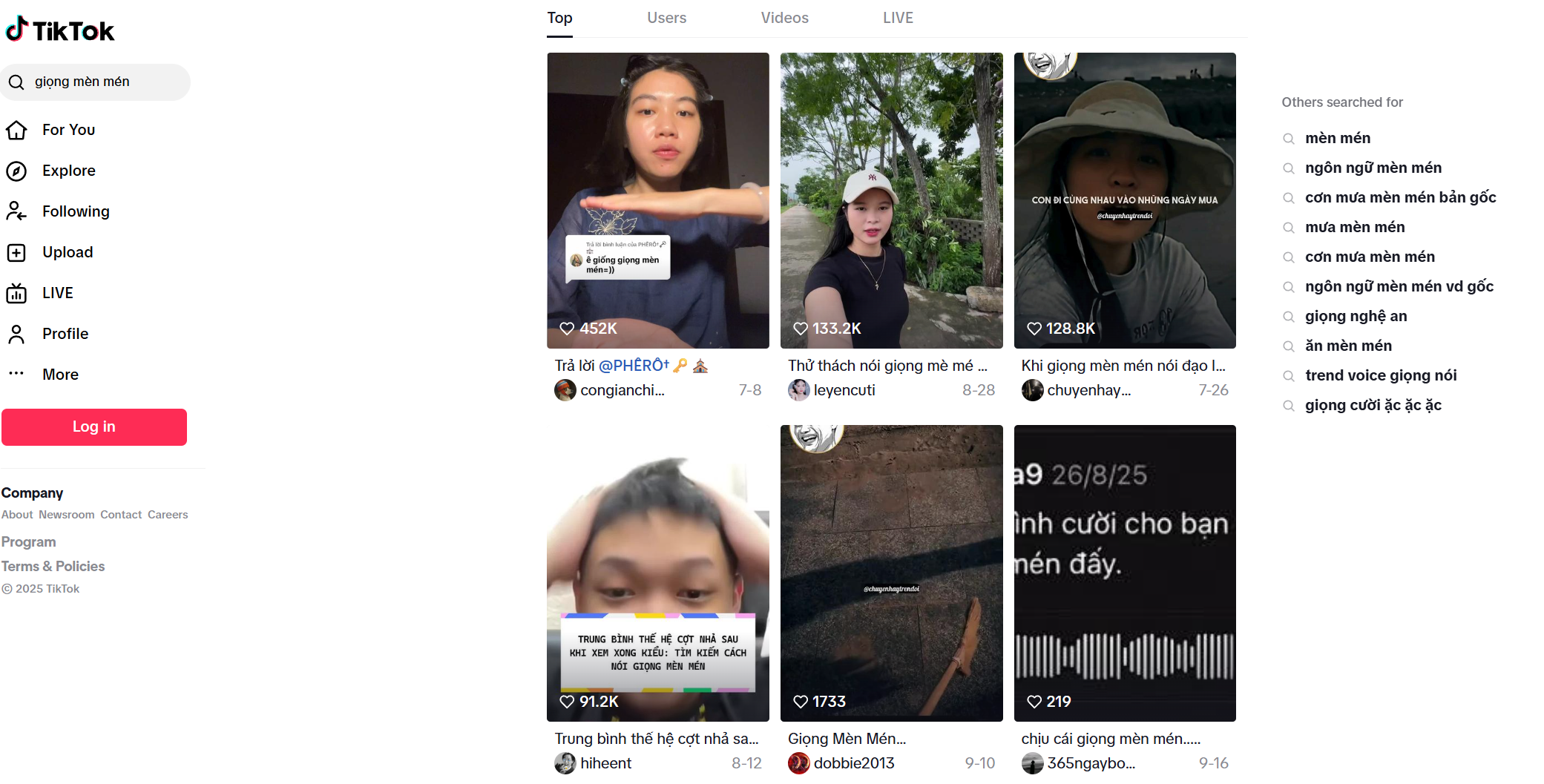
Many believe that the "idea" for the "men men accent" trend originated from a video clip of a girl from an ethnic minority group, sharing her difficulties working in an industrial zone in the city in Vietnamese with a distinctive accent. The girl recounted being treated poorly and said she'd rather stay home and "eat sour men men" (a euphemism for eating sour men men) than endure such hardship.
The video clip quickly went viral on TikTok, but what's thought-provoking is the crowd's reaction. Instead of empathizing and sharing with a young worker facing injustice and discrimination, they joined in imitating her voice, adding "naive" expressions, exaggerating her intonation, and creating a series of mocking videos for amusement. This gave rise to the "trend" of mimicking the "mèn mén voice."
On TikTok, Facebook, YouTube, and other platforms, there are thousands of video clips featuring the "Mèn Mén accent," with all sorts of creative content: challenges to speak the "Mèn Mén accent," singing in the "Mèn Mén accent," teaching the "Mèn Mén accent" to beginners, taking a 9.0 speaking test in the "Mèn Mén accent," teaching foreigners to speak the "Mèn Mén accent," and so on.
Most participants stood in the position of the majority, laughing at differences without realizing they were contributing to prejudice. This is not a localized phenomenon but evidence of a linguistic power mechanism: the voice of the dominant group becomes the norm, while the voice of the minority group is easily turned into an object of ridicule.
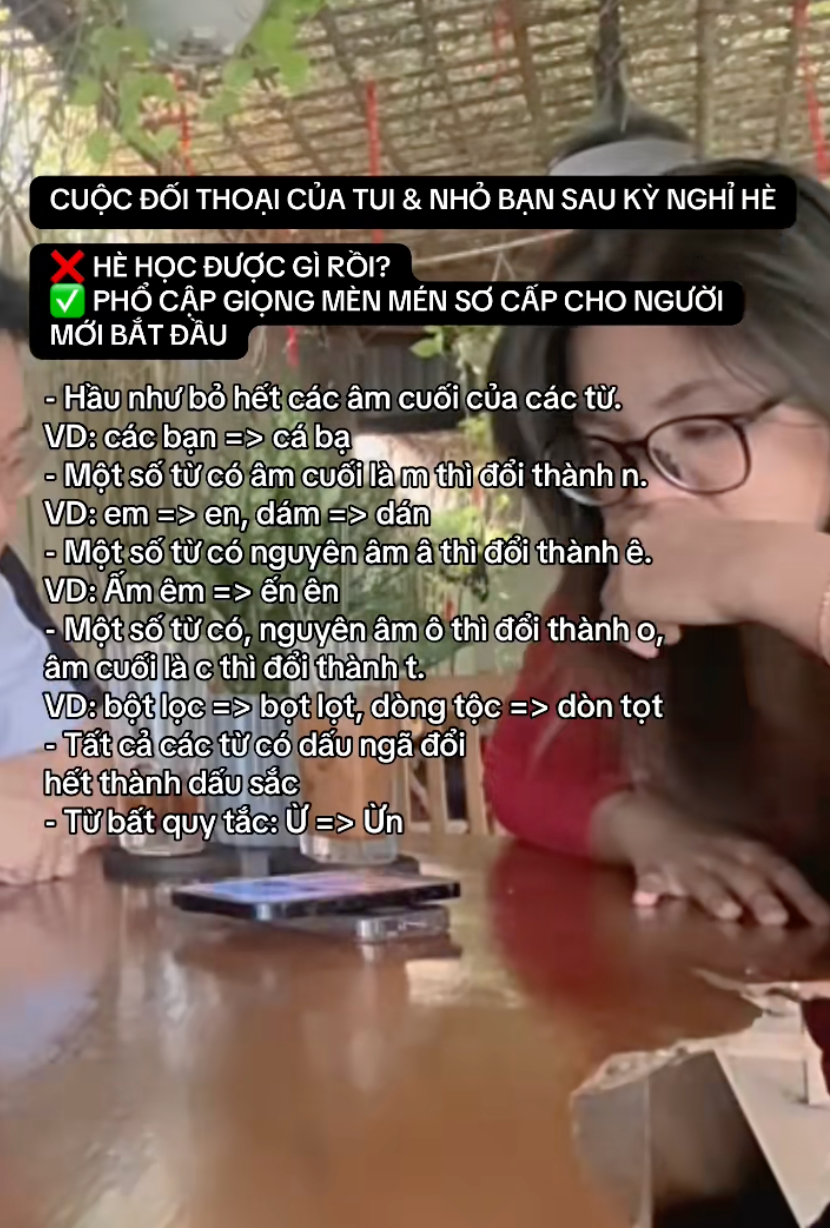
This phenomenon is not new when viewed in a broader context, from comedy stages and plays to video clips on the internet. Audiences have often witnessed ethnic minorities being portrayed with awkward speech, unusual clothing, and naive behavior.
Many social media content creators continue this trend by turning customs and expressions into material for humor. A prime example that once caused public outrage was the YouTube channel A Hy TV, whose numerous skits were deemed to defame and insult the honor and dignity of ethnic minorities, prompting the Committee for Ethnic Minorities to request relevant authorities to intervene. In essence, such products are not merely "entertainment" but rather exploit the cultural expressions of vulnerable groups for viewership.
The pronunciation of ethnic minorities when speaking standard Vietnamese is the result of historical language contact, their unique phonological systems, rhythms, and tones; it is evidence of bilingual competence and linguistic adaptability, not evidence of "lack of understanding." Mimicking accents, distorting tones, or separating a native noun (e.g., "mèn mén") from its original meaning to turn it into a derogatory adjective is a linguistic modification aimed at belittling the target. From a broader perspective, this behavior is an expression of discriminatory attitudes based on accent, leading to feelings of discrimination and psychological harm in the person being mimicked, causing them to lose confidence and even affecting their employment and educational opportunities.
The consequences of ridicule extend beyond personal feelings. It also carries the risk of being deprived of one's voice. When a voice is treated as a joke, many messages that ethnic minorities want to convey are easily drowned out by the laughter of the crowd. Speakers are no longer listened to seriously, and listeners lack the respect to consider their words. In the long run, this can lead younger generations of ethnic minorities to try to conceal their linguistic identity, forcing themselves to speak "standard" to avoid discrimination. Linguistic diversity is therefore at risk of being erased, as distinctive tones and rhythms gradually disappear in the effort to integrate through assimilation.
From a societal perspective, the act of mocking voices deepens the divide between "us" and "them." Those in the majority feel safe laughing at differences, while those in the minority experience an added layer of inferiority complex. More dangerously, in the age of social media, a single mocking video can spread millions of views, impacting the group faster than any attempt at constructive criticism or education. Prejudices that were thought to have faded are revived and amplified under the guise of harmless entertainment.
So what do we need to do? First, content creators must have a social and cultural responsibility. They need to understand that laughter cannot be built on belittling others. There are many ways to be funny while remaining civilized and humane. Next, authorities must resolutely deal with cases of exploiting ethnic cultural characteristics to defame, belittle, or mock. At the same time, the press and media channels need to proactively spread positive stories, affirming the value of linguistic and cultural diversity. Most importantly, we need to create opportunities for ethnic minorities themselves to speak up, to tell their stories in their own voices, and to be listened to with respect.
Voice is not just a means of communication, but also a living heritage of a community. It carries history, memories, knowledge, and pride. To turn that voice into a joke is not only an insult to individuals, but also to an insult to an entire culture. Condemning mockery is not an overreaction, but a necessary step towards building a just society that respects diversity. Only when we listen to and appreciate all voices can a country truly become culturally rich and affirm civility in its interactions with one another.
Source: https://baonghean.vn/gieu-nhai-giong-noi-thieu-so-บน-mang-xa-hoi-van-nan-van-hoa-10308708.html











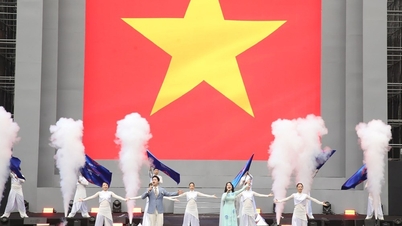

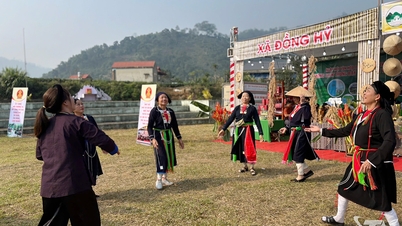

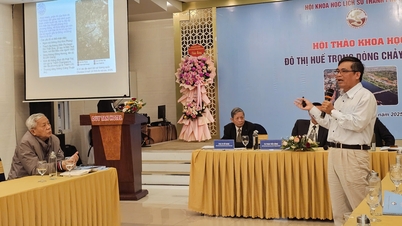
























![[Photo] Prime Minister Pham Minh Chinh holds a phone call with the CEO of Russia's Rosatom Corporation.](/_next/image?url=https%3A%2F%2Fvphoto.vietnam.vn%2Fthumb%2F1200x675%2Fvietnam%2Fresource%2FIMAGE%2F2025%2F12%2F11%2F1765464552365_dsc-5295-jpg.webp&w=3840&q=75)





































































Comment (0)